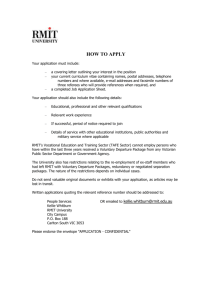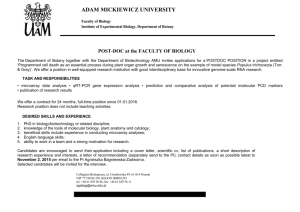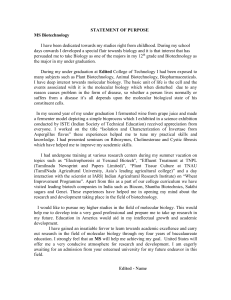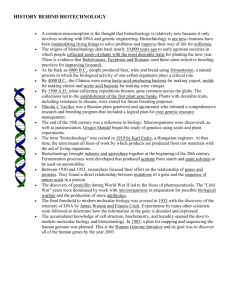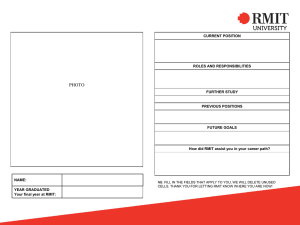Department of Biotechnology and Environmental
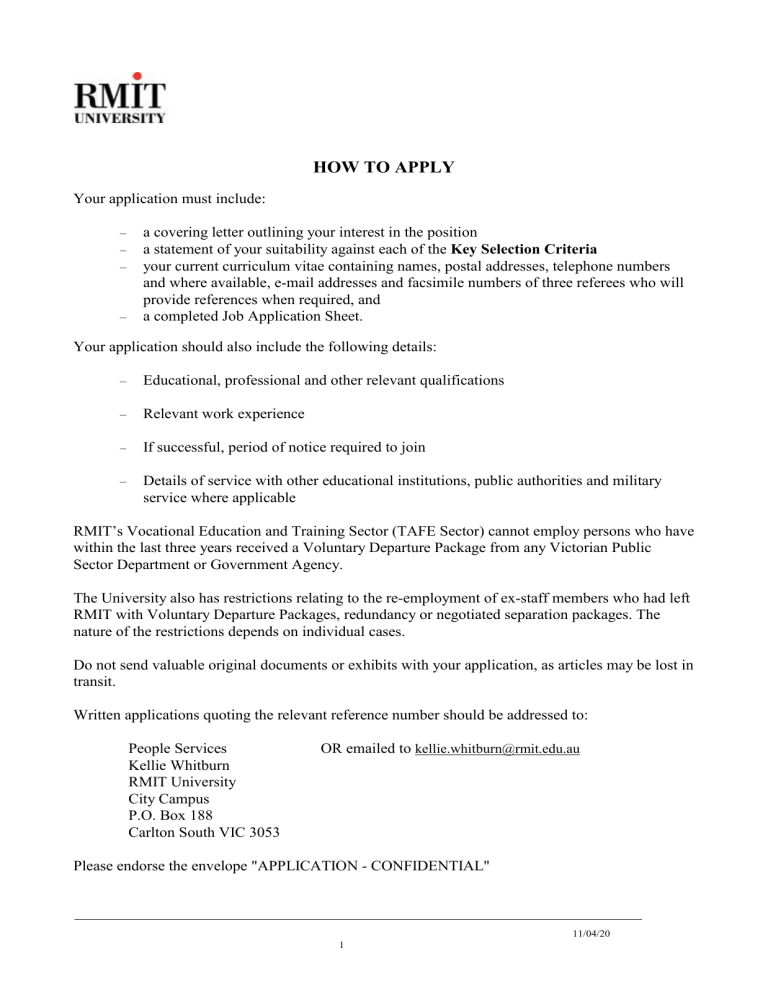
HOW TO APPLY
Your application must include:
–
–
– a covering letter outlining your interest in the position a statement of your suitability against each of the Key Selection Criteria your current curriculum vitae containing names, postal addresses, telephone numbers and where available, e-mail addresses and facsimile numbers of three referees who will provide references when required, and a completed Job Application Sheet. –
Your application should also include the following details:
Educational, professional and other relevant qualifications –
Relevant work experience –
– If successful, period of notice required to join
– Details of service with other educational institutions, public authorities and military service where applicable
RMIT’s Vocational Education and Training Sector (TAFE Sector) cannot employ persons who have within the last three years received a Voluntary Departure Package from any Victorian Public
Sector Department or Government Agency.
The University also has restrictions relating to the re-employment of ex-staff members who had left
RMIT with Voluntary Departure Packages, redundancy or negotiated separation packages. The nature of the restrictions depends on individual cases.
Do not send valuable original documents or exhibits with your application, as articles may be lost in transit.
Written applications quoting the relevant reference number should be addressed to:
People Services
Kellie Whitburn
RMIT University
OR emailed to kellie.whitburn@rmit.edu.au
City Campus
P.O. Box 188
Carlton South VIC 3053
Please endorse the envelope "APPLICATION - CONFIDENTIAL"
1
11/04/20
JOB APPLICATION SHEET
PLEASE COMPLETE ALL DETAILS LISTED BELOW AND EMAIL THIS SHEET
WITH APPLICATION TO kellie.whitburn@rmit.edu.au
or post to the address below.
Reference No 50006828
Position Title
Family Name
Given Name(s)
Home Address
Postcode
Email Address
Telephone
Post Doctoral Research Fellowship
Title
Home
State
Work Mobile
Citizenship
Resident Status if not Australian
Where did you see this job advertised?
APPLICATIONS ADDRESSED TO
People Services
Kellie Whitburn
RMIT University
City Campus
PO Box 188
Carlton South Vic 3053
FOR PEOPLE SERVICES USE ONLY
HR system updated and acknowledgement sent
Date or email to kellie.whitburn@rmit.edu.au
Initial
2
11/04/20
POSITION DESCRIPTION
1. POSITION SUMMARY -
Position Title:
Position Number:
Time Fraction:
Tenure Status:
Classification:
Salary Range:
Faculty:
Post Doctoral Research Fellowship
50006828
Full Time
3 year Fixed Term Research
Academic Level A
$37,048 - $50,251
Life Sciences
Department: Biotechnology and Environmental Biology
Campus Location: Based at the Bundoora campus
2.
THE UNIVERSITY
RMIT University is a multi-level dual sector education, training and research service organisation, offering programs ranging from certificate level vocational programs through tailored programs for industry and community clients, to post-graduate research programs. The University has several companies, which are responsible, for commercial activities relating to the University’s core functions.
The University’s goal is to create and sustain a distinctive world-class university at the forefront of technical and professional education and real-world research, through continuous improvement and with all staff committed to quality management processes. As a world-class university, RMIT will be recognised as a leader in its teaching and learning processes, research activities and community services.
Also see: www.rmit.edu.au
3. THE FACULTY
The Faculty of Life Sciences has one department located on the City Campus and all of its other organisational units located on the Bundoora West Campus of RMIT. The City Campus department is:
Department of Health & Biosciences
The units located at Bundoora are:
3
11/04/20
Department of Biotechnology & Environmental Biology,
Department of Complementary Medicine,
Department of Nursing & Midwifery,
School of Medical Sciences
Faculty Centre
Industry Training and Consultancy Unit
The Faculty provides a comprehensive range of TAFE, undergraduate and postgraduate courses in biomedical, plant, environmental and health sciences and nursing. In keeping with the traditions of
RMIT, these courses give particular emphasis to practical and vocational applications of the skills and knowledge taught.
The commercial activities of the Faculty are coordinated by the Industry Training and
Consultancy Unit. Among the Unit’s activities are the running of short courses, tendered projects and customising training programs for industry, both on and offshore.
The Faculty is continuing to develop and expand its already extensive research activities, which are of high quality and the outcomes of which benefit the community. Research is concentrated within areas relevant to environmental management, biotechnology, maintenance of health and prevention, early diagnosis and treatment of disease. The increased skills and knowledge gained through research flow directly to the undergraduate programs.
The Faculty offers programs locally, in regional Victoria, nationally and internationally.
Department of Biotechnology and Environmental Biology
While Academic Departments have been established on combinations of like disciplines, there are significant areas of interdepartmental teaching and research.
The Academic Structure of the Department of Biotechnology and Environmental Biology is:
Disciplines: Animal and Plant Sciences
Biotechnology
Microbiology
Courses: B.App.Sc (Applied Biology and Biotechnology)
B.App.Sc (Hons) (Applied Biology and Biotechnology)
Grad. Dip. (Applied Microbiology)
Ph.D (Research)
Research Group: Bioscience Research Group
M.App.Sc (Applied Microbiology and Biotechnology)
M.App.Sc (Biotechnology and Business)
M.App.Sc (Research)
4
11/04/20
comprising:
Environmental Biology & Ecotoxicology research
Oil Spills research
Biomarkers development for toxic chemicals
Bioremediation
Aquaculture
Bacterial and viral vaccine development
Plant Pathology
Plant Biotechnology
Avian Virus research and development
Microbial pathogenesis
The Department of Biotechnology and Environmental Biology is a multi-disciplinary department with highly qualified staff, modern laboratory facilities and equipment. It conducts courses at all levels - Undergraduate, Honours and Postgraduate (by research and coursework). Its staff are active in research, publish in leading journals and conference proceedings, and attract over $1M research funds each year from both Government and industry sources. The Department has close contacts with industry and its staff consult regularly on issues in their areas of expertise.
The undergraduate, honours and postgraduate programs are fully accredited and are recognised by the appropriate professional organisation. Staff also conduct short courses for professionals in Australia and overseas.
Staff and Student Numbers
Academic Staff 18
Research Fellows
Research Technical Staff
6
11
General Staff
Part time Casual Academic & Research Staff
Part time Casual General Staff
Undergraduate (1st-3rd year)
Honours (4 th year)
Postgraduate
17
58
28
158
15
100
5
11/04/20
Department Budgets
Commonwealth Operating Grants
Research Grants
Tuition Fees from International, Postgraduate and other courses
Other Income
$3,640,300
$1,868,198
$1,088,227
$69,998
Total $6,666,723
4. JOB SUMMARY
As part of the research grant supported by Rural Industry Research & Development
Corporation to develop and refine molecular tests and array technologies to determine mechanisms of pathogenesis of Campylobacter spp. The successful appointee will be required to develop DNA array technology to identify genes associated with pathogenesis in
Campylobacter jejuni as a precursor to improving vaccination strategies to control
Campylobacter spp in poultry.
5. REPORTING RELATIONSHIPS
The Senior Industry Research Fellow is directly responsible to Professor Peter Coloe, Head of Department.
6. SPECIFIC ACCOUNTABILITIES
Position Accountabilities
(a) to develop and refine DNA array systems that will enable identification of genes associated with Campylobacter pathogenicity.
(b) To utilise the array technology to identify virulence genes and the level of gene regulation.
(c) to extend the array technology to determine temperature regulated genes in C jejuni.
(d) to extend the use of the technology measure bacterial loads in various organs of infected chickens after infection.
(e) to participate in a limited manner in undergraduate and postgraduate teaching programs in Biotechnology
(f) to carry out other duties as may be directed from time to time by the Head of Department
(g) to liase with CSIRO Food Science Australia to develop the research program
6
11/04/20
Corporate Accountabilities
To contribute to the strategic direction setting and policy-making processes of the
University and the Division by participating in key Group, Divisional and University forums and undertaking specific Division level project/tasks.
Personal Development
To assume joint responsibility for career development by actively participating in various activities (mentoring, job rotation, secondments and joint group projects) and producing a jointly agreed development plan identifying key areas which will assist in your personal and professional development, these activities should be consistent with the Group and
Department Strategic Goals.
7. QUALIFICATIONS
Mandatory:
Applicants must possess a degree in science with a major in Microbiology,
Molecular Biology or Immunology and post-graduate qualifications at doctoral level. Experience in bacterial pathogenesis would be advantageous.
8. KEY SELECTION CRITERIA
Proven ability to undertake scientific research and development in bacteriology research programs
Extensive experience in microbiology and molecular biology techniques
Good interpersonal communication.
The ability to work cooperatively as a member of a team to achieve goals.
Computer literacy and the ability to search complex databases.
Experience/Knowledge
Evidence of academic qualification at Doctoral level
Extensive experience and knowledge in microbiology and molecular biology techniques and the development and application of DNA microarrays.
Skills/Abilities
The ability to provide scientific and technical expertise in research programs
A demonstrable capacity to plan strategically and think creatively
Good interpersonal and communication skills
The ability to work as a member of a professional team
7
11/04/20
